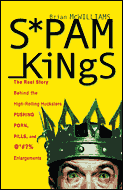I mentioned I set up some new spam traps a few weeks ago. This amusing disclaimer appeared in one of them over the weekend:
You have received this message for one of the following reasons:
1) By accident.
2) Someone else is using your email address without your knowledge.
3) You have responded to one of our free gifts/courses.
4) You have sent an e-mail to one of our email addresses.
5) You are a member of one of the safelists, by doing so, you have agreed to receive this message
Heh. I like #1. They accidentally harvested the address from a web page and added it to their lists. “You know, I was surfing the web, and I left my autospam-assistant program running, and one thing led to another, and the next thing I knew, it was spamming you.”
Of course, the rest of the disclaimer is funny too, if you’re familiar with the history of spam legislation. Continue reading →
